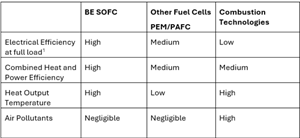News
Bloom Energy announces H2 solid oxide fuel cell with 60% electrical efficiency
Bloom Energy, a world leader in solid oxide fuel cell (SOFC) technology, is now offering the Bloom Energy Server power solution with ~60% electrical efficiency while using 100% H2. Bloom engineers achieved the milestone efficiency at the company’s research and development facility in Fremont, California.
“With our world-leading efficiency electrolyzer and the Bloom Energy fuel cell technology capable of running on natural gas and H2 blends, this achievement builds on our leadership position in the H2 industry,” said Ravi Prasher, chief technology officer for Bloom Energy.
Carbon-free H2 fuel cell for electricity production enables 24 X 7 clean power in conjunction with other renewable electricity sources. As energy intensive industries like data centers and advanced manufacturing continue to place increased electricity demand on the grid, efficient distributed electricity production from carbon-free H2 is a vital tool to reduce both carbon emissions and strain on the congested grid.
Carbon-free H2 is generally more expensive than traditional sources of fuel, such as natural gas or grey H2, making high electrical efficiency critical to achieving low-cost electricity. Bloom’s breakthrough electrical efficiency at 60% will enable wider adoption of H2 as a fuel source. Blending H2 with natural gas provides for a reduction in CO2 emissions today while allowing for a future proof, fuel flexible, path as the H2 economy continues to advance across numerous sectors.
SOFC technology is uniquely placed in the energy transition through the production of electricity by direct electrochemical conversion as compared to conventional combustion technologies, such as turbines and reciprocating engines. This leads to significantly higher electric efficiency and negligible environmental pollutants as compared to the combustion technologies as shown in the table below.
In addition to offering unmatched electrical efficiency, Bloom’s high temperature SOFC technology is also combined heat and power (CHP) enabled, allowing customers to utilize high temperature heat. This is in contrast to other fuel cell technologies which can only provide low temperature heat. Customers can use this high temperature heat in numerous applications, including running absorption chillers, industrial processes, and building heating. When fully utilized, this allows for a combined 90% efficiency, creating an additional value stream for the customer and accelerating the adoption of H2.
The table below highlights the advantages of Bloom’s offering over traditional systems and other fuel cell technologies using H2.


